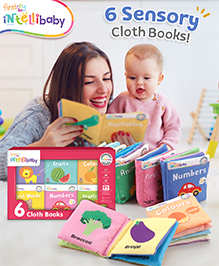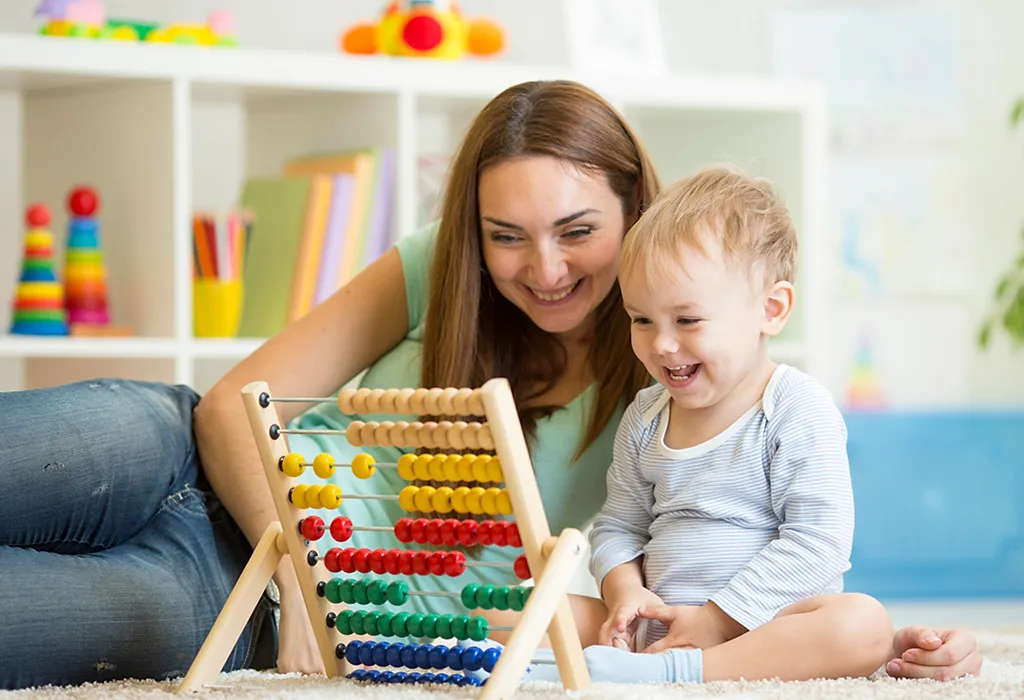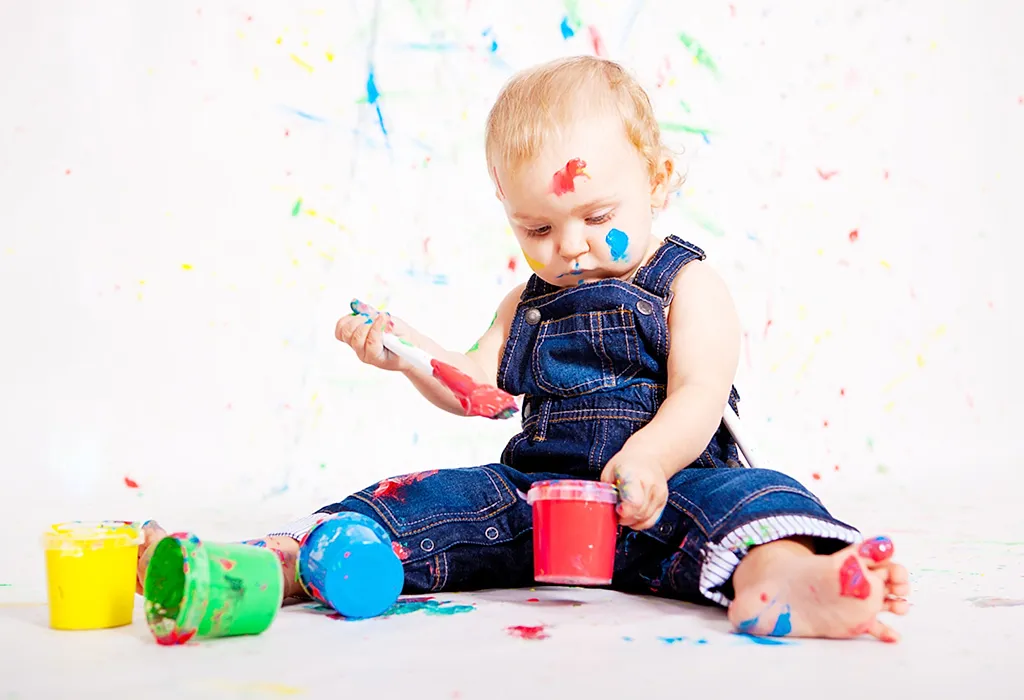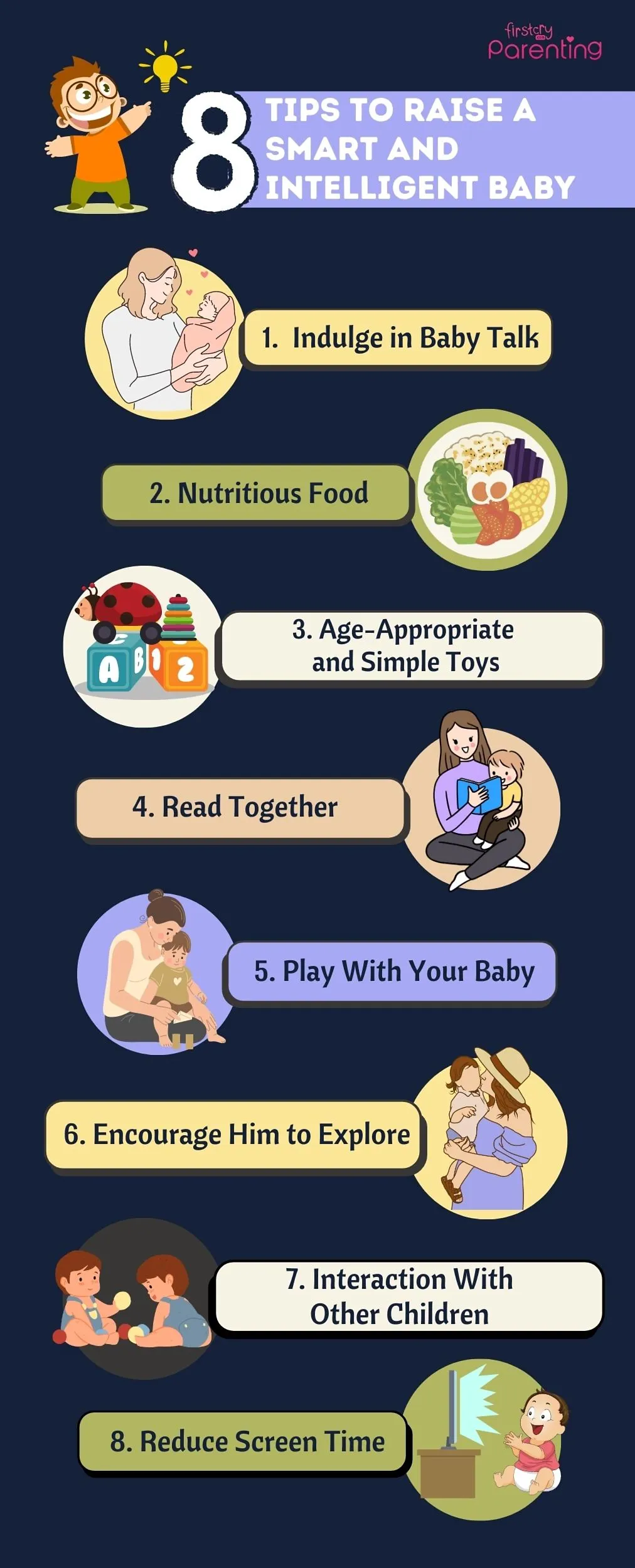Top 15 Tips on How to Make a Baby Smart and Intelligent
In this competitive age, parents are often concerned about whether their child is intelligent enough and wonder if they can do anything to help their child’s intelligence develop. It is believed that the right amount of stimulation at an early age considerably enhances a child’s mental capabilities. The first few years are thus the prime time to focus on a child’s intellectual development. So, how to make your baby smart and intelligent? Well, there are several find and scientific ways to prompt a child to become smarter and brilliant than before. Join us as we uncover some never-heard, top practical tips to help you raise your child to be intelligent.
15 Effective Ways to Raise a Smart and Intelligent Baby
Making an infant smarter is no rocket science; it’s rather quite possible. Continue reading to find some practical and effective tips to make your little one smarter and brighter.
1. Indulge in Baby Talk
Communication is a key skill that is essential in enhancing the intelligence of a child. Indulging in conversations with your child allows them to bond with you, develops self-esteem and confidence, and improve nonverbal abilities like reasoning and understanding numbers. In fact, a research suggested that by simply engaging in conversations with the child, whether baby talk, can positively impact their language and brain development (1).
Encourage your child to improve his communication skills by involving him in verbal activities. Talk to your baby about what you are doing, how your day went, or anything else. Include descriptive language, and he will learn to use it in his own conversations. Strong language skills are always associated with higher intelligence. So, give your child the benefit of this skill.
2. Be Openly Affectionate
A secure baby tends to be more confident and thus more receptive to challenges in life. Start him off on the right path by providing a safe and happy environment at home. Skin-to-skin contact and baby massages allow you and your baby to bond. Tickle him, let him climb over you and play, cuddle with him, put him on your lap, or wear him in a baby sling.
3. Nutritious Food
When your baby is ready to start solid food, include nutrient-rich foods to help his cognitive development. Foods like eggs, green leafy vegetables, fruits, nuts, and seeds are rich sources of vitamins and minerals necessary for your baby’s overall healthy development. Fish, a rich source of omega-3 fatty acids, has a positive effect on cognitive outcomes (2).
4. Stimulate With Age-Appropriate and Simple Toys
While many toy companies are focusing on infant products, not all of them are suited to every baby’s intellectual capacity. Some of them may overwhelm and frustrate your baby. So, before introducing the toy, analyse whether it is suitable for his capabilities. The right toys will intrigue him, stimulate him, and be excellent educational tools.
5. Play With Your Baby
Guided play with your child will direct his attention and give him new opportunities to explore and understand. Set aside time to play with your baby regularly. Bring yourself to his level of understanding and indulge in activities that appeal to his taste. Slowly introduce new play ideas that will encourage him to think beyond what he is aware of. Since babies love to mimic, it won’t be long before your baby gets the hang of it and races ahead with his new-found skills. Indulging in pretend play and imaginative play ensures tapping new capacities of the brain (3).
6. Read Together
Books are an excellent tool to stimulate your baby’s imagination and thinking capabilities. Read to your baby every day. Choose bright-coloured books with various textures and simple images that will hold his interest. Initially, your baby may prefer the same book, but he will slowly learn to explore more options. The more you familiarise your baby with letters and pictures, the more inclined he will be to read when he is older.
7. Weave Stories Around Him
When you introduce your baby to books and stories, try to make him the protagonist of his favourite tales. As the baby learns to relate these stories to his own environment, he will be able to connect better with the things around him. It will also develop his interest in stories and storytelling, and soon, he might start telling you his own tales.
8. Encourage Him to Explore
Expose your child to new and unfamiliar environments and encourage him to explore these new spaces. Narrate what you see, and appear enthusiastic about new things you come across. Even a trip to the supermarket can be visually stimulating for a child. The more experiences you give your baby, the more he will learn.
9. Introduce Your Child to Letters and Numbers Early
Don’t wait for your child to start school for him to learn numbers and letters. Start counting at home during your play sessions and point out letters on boards and signposts. The more exposure your child receives to the written word, the easier it will be for him to understand and study it when the time comes. Verbal and physical cues such as sign language will enhance his ability to understand and allow him to associate them with things he sees around himself.
10. Create Opportunities to Interact With Other Children
Social interactions provide stimulating experiences and also prepare your child to face challenges as he grows up. Set up play-dates with children of his age or take him to the park to play with other children. When you supervise his interactions at this stage, you can gently guide him and support him in making good friends. As he learns valuable lessons about interacting with others, he will also be better equipped to handle unpleasant situations effectively when he is older.
11. Encourage His Curiosity
Children are naturally curious, and this curiosity, when stimulated, can help them learn more. Stimulate your child’s interest by providing him with plenty of opportunities to discover new things. Appreciate when he does something new so he is motivated to keep exploring. Give him child-friendly play materials from everyday life, and let his imagination grow and take him places.
12. Reduce Screen Time
Although there are numerous educational shows and programs for young children, exercise caution when exposing your child to them. Several studies found a negative impact on the brain in young children with exposure to screens. The American Academy of Pediatrics (AAP) suggests no screen time for babies under 18 months of age other than video chatting. For 18 to 24 months of age, only quality shows or apps should be streamed (4).
Therefore, limit screen time and focus on hands-on activities, as these will stimulate your child better. Avoid letting your child play with tablets and mobiles, as these can be damaging to their eyes. Too much television exposure will also lead to a sedentary lifestyle, vision problems, and reduced thinking capabilities.
13. Prompt Your Baby’s Vision
Teaching them to be aware and observe minute details of what they see and perceive right from the early days will help a lot in their later days and help build a successful future. Start by keeping yourself in their visionary perimeter by establishing good eye contact as babies learn to recognise faces early on. Having them stare at their reflection and their limb movements in the mirror can improve hand-eye coordination and quick observance.
14. Breastfeed Exclusively
Breastfeeding is not just advised for filling up the tummies of babies; it is advised to provide them with necessary nutrition and keep them protected from several neonatal ailments. Breast milk contains several nutrients and antibodies that protect a baby’s immune system. A healthy immune system means a healthy and smarter baby. In fact, the WHO and UNICEF suggest exclusive breastfeeding for at least the first six months of life and further breastfeeding till two years of age. The WHO also informs that breastfed children are more likely to perform better on intelligence tests and less likely to be prone to diabetes and obesity in later life (5).
According to a 2021 study, breastfeeding and its duration signified a greater role in the IQ level of a child; the longer the breastfeeding period, the higher the IQ at 5 years of age (6).
15. Ensure Good Sleep
Sleep is an extremely important factor in establishing a baby’s awareness and IQ. Infant sleep promotes healthy brain development, impacting learning and memory and resulting in healthy cognitive, psychosocial, and physical development in early childhood (7) (8). Plus, if a baby does not get enough sleep, they will wake up agitated and will not be able to observe or perform well in play, learning, and daily activities that subtly help with brain development.
FAQs
1. What activities can parents indulge to promote healthy brain development in their children?
You can enjoy puppet shows and visit parks, libraries, and children’s bookstores. For toddlers, you can dedicate each week to a particular letter, suppose the letter A, read books or stores that start with A, cut out snacks in the shape of A, eat foods starting with A, etc. You can enjoy counting games, sing educational or learning songs together, play a treasure hunt in which coloured items or number letters need to be searched, and ask them to help you with laundry. This is also the time to introduce your kiddo to nature and its beautiful beings. You can read and learn about various birds and insects and, later on, visit the parks and zoos to watch them in person. This will help the sensory system develop, and they will memorise what they read.
2. What positive discipline techniques can I use to ensure a healthy parent-child bond?
Positive parenting ensures healthy emotional development while being disciplined. This helps teach children how to behave without being too harsh on them. Inculcating positive discipline techniques right from infancy will help establish good behaviour in children and safeguard their future from bad influences (9). You can establish the word “no” to refrain from bad, harmful, or unwanted situations and choose to speak in only positive language in all situations. For example, instead of saying, “Don’t hit the dog!” you can say, ‘Hey, pat the dog gently, please.”
We live in a globally competitive world, so there is a constant need to keep ourselves updated with the happenings of the world. Raising your baby to be smart is not an arduous task but one that requires understanding and know-how of dealing with things smartly. Eventually, your baby will benefit from these tricks and will be equipped to handle the many challenges life throws his way.
Infographic: Tips on How to Make Baby Smart and Intelligent
References/Resources:
1. Massachusetts Institue of Technology; Talking With Your Children Is Important for Their Brain Development; Association of American Universities; https://www.aau.edu/research-scholarship/featured-research-topics/talking-your-children-important-their-brain; February 2018
2. Roberts M, Tolar-Peterson T, Reynolds A, Wall C, Reeder N, Rico Mendez G. The Effects of Nutritional Interventions on the Cognitive Development of Preschool-Age Children: A Systematic Review. Nutrients; PubMed Central; https://www.ncbi.nlm.nih.gov/pmc/articles/PMC8839299/; January 2022
3. Cortese. R; Helping Toddlers With Language Skills; Child Mind Institute; https://childmind.org/article/helping-toddlers-expand-their-language-skills/
4. Hill. D, et al.; Media and Young Minds; Pediatrics; https://publications.aap.org/pediatrics/article/138/5/e20162591/60503/Media-and-Young-Minds?autologincheck=redirected; November 2016
5. Breastfeeding; WHO; https://www.who.int/health-topics/breastfeeding#tab=tab_3
6. Plunkett. B. A, et al.; Association of Breastfeeding and Child IQ Score at Age 5 Years; Obstet Gynecol; PubMed; https://pubmed.ncbi.nlm.nih.gov/33706345/; April 2021
7. Fan Jiang; Sleep and Early Brain Development; Annals of Nutrition and Metabolism; https://karger.com/anm/article/75/Suppl.%201/44/42656/Sleep-and-Early-Brain-Development; June 2020
8. Tham EK, Schneider N, Broekman BF. Infant sleep and its relation with cognition and growth: a narrative review. Nat Sci Sleep.; PubMed Central; https://www.ncbi.nlm.nih.gov/pmc/articles/PMC5440010/; May 2017
9. What’s the Best Way to Discipline My Child?; American Academy of Pediatrics; https://www.healthychildren.org/English/family-life/family-dynamics/communication-discipline/Pages/Disciplining-Your-Child.aspx
Also Read:
Intelligent Baby Signs
How to Raise a Smarter Child at Home
Know Your Baby’s Personality Based on Birth Month
Here’s What Your Baby’s Day Of Birth Predicts About His/Her Personality
Was This Article Helpful?
Parenting is a huge responsibility, for you as a caregiver, but also for us as a parenting content platform. We understand that and take our responsibility of creating credible content seriously. FirstCry Parenting articles are written and published only after extensive research using factually sound references to deliver quality content that is accurate, validated by experts, and completely reliable. To understand how we go about creating content that is credible, read our editorial policy here.



















.svg)


















